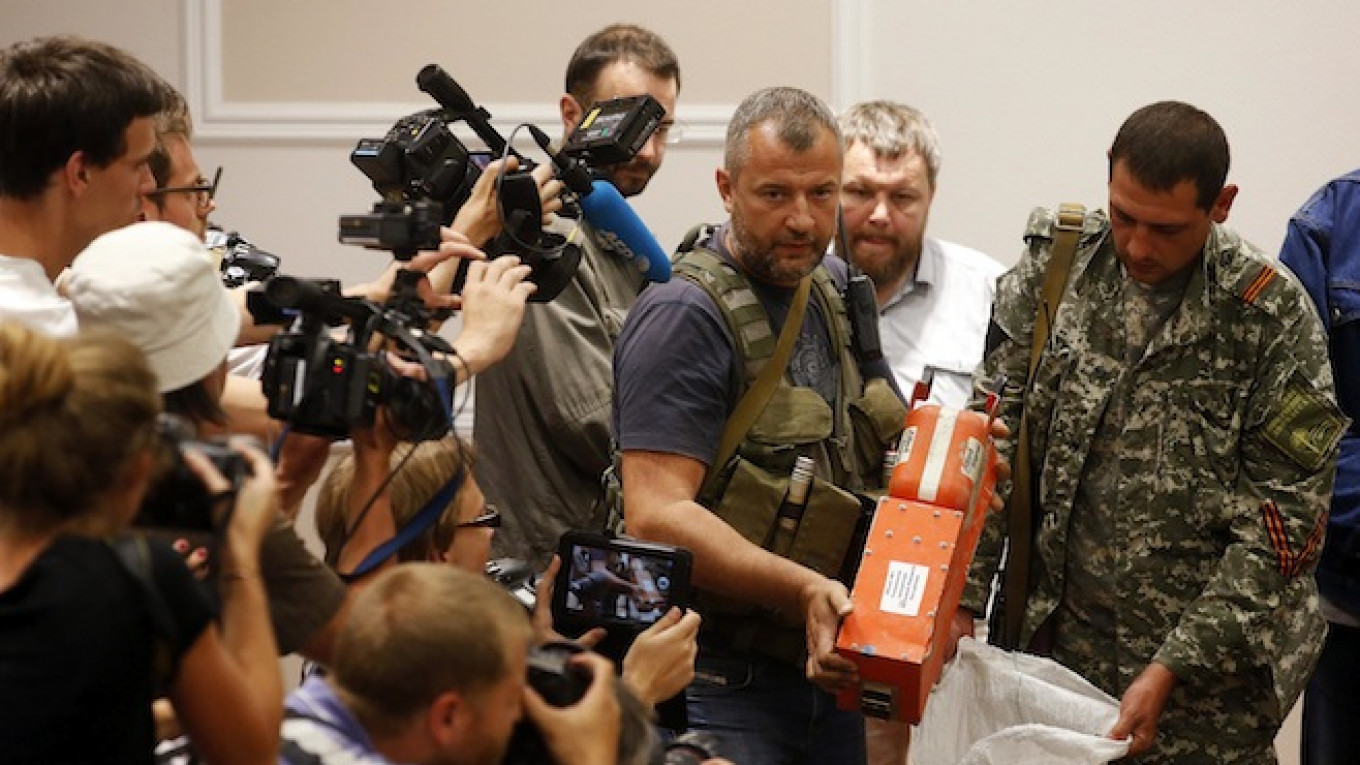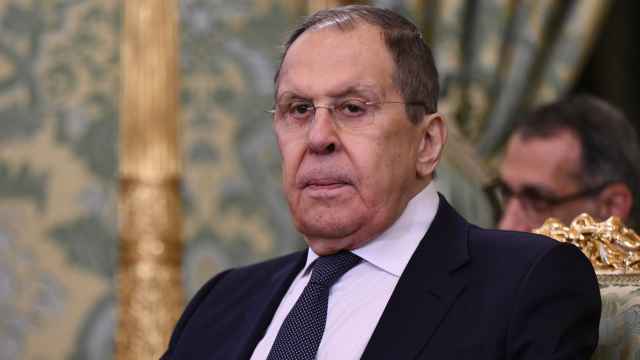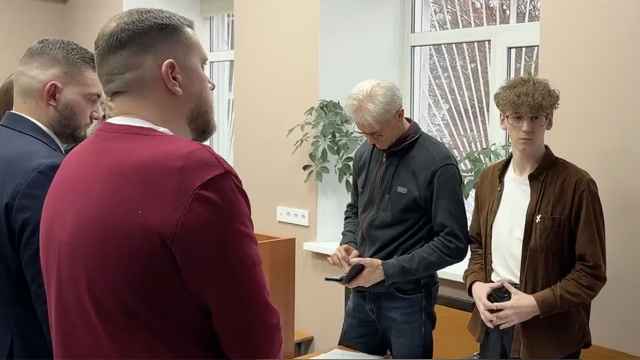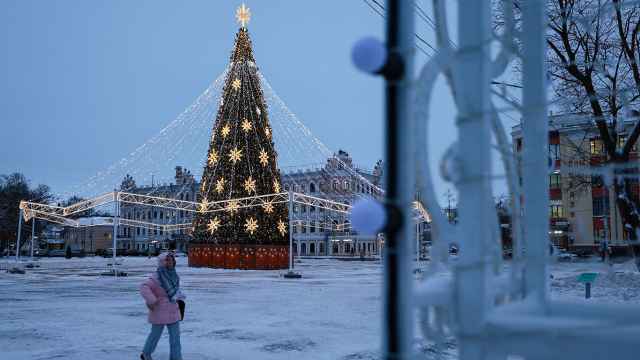A train carrying the remains of some of the nearly 300 victims of the Malaysia Airlines plane downed over Ukraine was heading for Ukrainian government territory on Tuesday as a separatist leader handed over the plane's black boxes to Malaysian experts.
Dutch Prime Minister Mark Rutte told a news conference on Monday that the train carrying around 200 body bags was on its way to rebel-held Donetsk and then to Kharkiv, which is in Ukrainian government hands, from where the bodies would be taken back to the Netherlands to be identified.
The train left the crash site after the Malaysian prime minister reached agreement with the separatists for recovered bodies to be handed over to authorities in the Netherlands, where the largest number of victims came from.
Early on Tuesday, senior separatist leader Aleksander Borodai handed over the black boxes in the city of Donetsk.
"Here they are, the black boxes," Borodai told a room packed with journalists at the headquarters of his self-proclaimed Donetsk People's Republic as an armed rebel placed the boxes on a desk.
Colonel Mohamed Sakri of the Malaysian National Security Council told the meeting the two black boxes were "in good condition."
The handover of the bodies and black boxes, and reports by international investigators of improved access to the wreckage of the airliner four days after it was shot down, occurred against calls for broader sanctions against Russia for its support for the rebellion, although Western leaders are struggling to agree on a united response.
Shaken by the deaths of 298 people from across the world, Western governments have threatened Russia with stiffer penalties for what they say is its backing of pro-Russian militia who, their evidence suggests, shot the plane down.
At the UN, the Security Council unanimously adopted a resolution demanding those responsible "be held to account and that all states cooperate fully with efforts to establish accountability."
It also demanded that armed groups allow "safe, secure, full and unrestricted access" to the crash site.
"We owe it to the victims and their families to determine what happened and who was responsible," said Australian Foreign Minister Julie Bishop, who traveled to New York to negotiate the UN resolution. Australia lost 28 citizens in the crash.
The Kremlin said in a statement late on Monday that Vladimir Putin spoke to Dutch Prime Minister Mark Rutte on the telephone, with both giving a "high assessment of the resolution passed by the UN Security Council on the investigation into the catastrophe."
Meanwhile, EU foreign ministers were scheduled on Tuesday to discuss further penalties against Russia, but the most they are expected to do is to speed up implementation of sanctions against individuals, and possibly companies, agreed in principle last week before the plane was brought down.
Western leaders struggled to come to a united response against Moscow. France came under pressure on Monday from Washington and London over plans to deliver a second helicopter carrier to Russia.
Diplomats say more serious sanctions against whole sectors of the Russian economy will depend largely on the line taken by the Dutch, because of the high number of Dutch victims.
"It is clear that Russia must use her influence on the separatists to improve the situation on the ground," the Dutch prime minister said.
"If in the coming days access to the disaster area remains inadequate, then all political, economic and financial options are on the table against those who are directly or indirectly responsible for that," said Rutte.
Recovery Efforts
European security monitors said gunmen stopped them inspecting the site when they arrived on Friday, and Ukrainian officials said separatists had tampered with vital evidence.
But the spokesman for the European security monitors said they had unfettered access on Monday, and three members of a Dutch disaster victims identification team arrived at a railway station near the crash site and inspected the storage of the bodies in refrigerated rail cars.
Peter van Vliet, whose team went through the wagons dressed in surgical masks and rubber gloves, said he was impressed by the work the recovery crews had done, given the heat and the scale of the crash site. "I think they did a hell of a job in a hell of a place," he said.
As they went about their work, fighting flared in Donetsk, some 60 kilometers from the site, in a reminder of the dangers the experts face operating in a war zone.
The government in Kiev denied sending the regular army into the center of Donetsk, which pro-Russian separatists captured in April, but said small "self-organized" pro-Ukrainian groups were fighting the rebels in the city.
Four people were killed in clashes, health officials said.
The rebels' military commander Igor Strelkov said on his Facebook page up to 12 of his men died in Monday's fighting.
Donetsk is at the heart of a rebel uprising against rule by Kiev, and Ukrainian President Petro Poroshenko has vowed to retake the city as part of what Kiev calls its "anti-terrorist operation" against the separatists.
Television images of the rebel-controlled crash site, where the remains of victims had lain decomposing in fields among their personal belongings, have turned initial shock and sorrow after Thursday's disaster into anger.
See also:
Russia Backs UN Resolution for Access to Ukraine Plane Crash Site
A Message from The Moscow Times:
Dear readers,
We are facing unprecedented challenges. Russia's Prosecutor General's Office has designated The Moscow Times as an "undesirable" organization, criminalizing our work and putting our staff at risk of prosecution. This follows our earlier unjust labeling as a "foreign agent."
These actions are direct attempts to silence independent journalism in Russia. The authorities claim our work "discredits the decisions of the Russian leadership." We see things differently: we strive to provide accurate, unbiased reporting on Russia.
We, the journalists of The Moscow Times, refuse to be silenced. But to continue our work, we need your help.
Your support, no matter how small, makes a world of difference. If you can, please support us monthly starting from just $2. It's quick to set up, and every contribution makes a significant impact.
By supporting The Moscow Times, you're defending open, independent journalism in the face of repression. Thank you for standing with us.
Remind me later.






